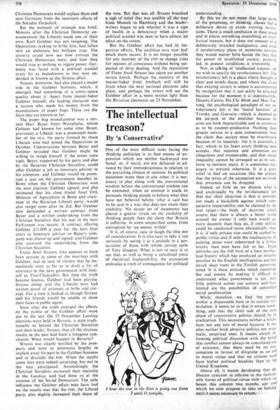The intellectual treason?
By 'a Conservative'
One of the most difficult tasks facing the thinking politician is to find means of ex- pression which are neither hackneyed nor banal, or, if novel, are not defeated in ad- vance by their immoderateness in relation to the prevailing climate of opinion. In political statement more than in any other, it is nec- essary to play along with the conventional wisdom before the conventional wisdom can be extended; when an attempt is made to persuade thinking people to believe what they have not believed before, what is said has to be said in a way that does not strain their credulity. No recent set of statements has placed a greater strain on the credulity of thinking people than the claim that Britain is suffering, in some unspecified sense, from corruption by `an enemy within'.
It is, of course, easy to laugh the idea out of consideration. It is also easy to fake it too seriously by seeing it as a prelude to a per- secution of those with whom certain sorts of Tory disagree. What is not so easy is to see that, as well as being a calculated piece of rhetorical implausibility, the accusation embodies a truth of consequence for political
I hear the star in the East is going out from 7 until 11 tonight,
understanding.
By this we do not mean that large parts of the governing, or thinking, classes feel a
deliberate desire to erode existing institu- tions. There is much confusion in these areas and in places something resembling an intel- lectual treason, but it does not amount to a deliberately intended malignancy; and even if revolutionary plans or intentions existed,
they would matter little beside the fact that the power of established society, properly led, in present conditions is irresistible.
Nor, in talking of 'intellectual treason', do we wish to specify the revolutionary left. The revolutionary left is a place where thought is clear and minds sharp, and where the claim that existing society is unjust is accompanied by recognition that it can safely be attacked because for the moment it is indestructible. Despite Castro, Ho Chi Minh and Mao Tse- tung, the psychological paradigm of our re- volutionary left is the 'moral heroism' of Trotsky and Guevara—which is doomed to the ice-pick or the stretcher because its aims are both impracticable and so extensive as to be counter-productive. Nothing does greater service to a sane conservatism than the claim that society must be overthrown because of its injustice: for it is assuredly a fact, which in his heart every thinking man accepts; that injustice and alienation are ubiquitous and irremovable, and that social inequality cannot be arranged so as to con- form to intrinsic merit. It is sometimes nec- essary to pretend otherwise. It is a great relief to find on occasions like the present that the terms of the accusation are so crude that pretences can be dropped.
Indeed, so little do we dispute what is said analytically by the revolutionary left that our chief objection is that it provides too ready a backcloth against which com- parative respectability can be claimed by the real target—the body of doctrine which asserts that there is always a better world around the corner if only men would act more decently than they do, if only politics could be conducted more altruistically than it is, if only private vice could be curbed by public virtue and if only the inadequacies of existing states were submerged in a higher loyalty than men have felt so far. These attitudes are the full fruit of a long intellec- tual history which has produced an insanity peculiar to the English intelligentsia and has struck deep roots in the English governing mind. It is these attitudes which constitute the real enemy by making it difficult to understand what government is for, how little political action can achieve and how limited are the possibilities of controlled social amelioration.
While, therefore, we find 'the enemy within' a dispensable bore in its current for- mulation, it seems to us that it means some- thing, and that the chief task of the next phase of conservative politics should be its eradication. This necessitates neither a witch- hunt nor any sort of moral hysteria. It im- plies neither brisk abrasive politics nor prag- matic, empirical ones. It means simply in- forming political discussion with the belief that conflict cannot always be conciliated out of existence, that there need be no pre- sumption in favour of dirigisme as an aid to moral virtue and that no citizens need have higher political loyalties than to the United Kingdom. Above all, it means developing that de- liberate cynicism in relation to the fashion- able forms of political virtue with which We bean this column two months ago and
which we now propose to take on holiday until it seems necessary to return.






































 Previous page
Previous page